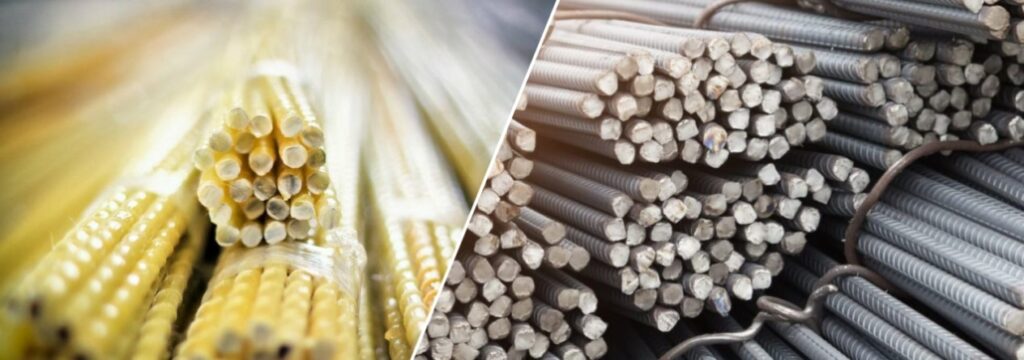जब औद्योगिक और सिविल क्षेत्रों में सार्वभौमिक रूप से उपयोग किए जाने वाले सरिया की बात आती है, तो आप FRP सरिया और इसके स्टील समकक्ष के बीच अंतर के बारे में सोच रहे होंगे। विभिन्न उद्योगों में FRP सरिया की ओर रुझान स्पष्ट होने के बावजूद, कुछ कंपनियां अभी भी संशय में हैं और FRP बनाम स्टील की संभावनाओं, विशेषताओं और प्रदर्शन पर कई शोध कर रही हैं।
सामग्री
स्टील सरिया और उसके गुण
स्टील अपने उत्कृष्ट गुणों के लिए जाना जाता है और इसका उपयोग विभिन्न उद्योगों में किया जाता है। स्टील का नुकसान यह है कि यह नमी और उसके परिणामस्वरूप जंग लगने के लिए प्रवण होता है। ऑक्सीकरण जैसी सभी प्रकार की रासायनिक प्रतिक्रियाएँ अंततः स्टील के गुणों पर नकारात्मक प्रभाव डालती हैं। इसलिए, कुछ उद्योगों में स्टील रिबार का उपयोग प्रतिबंधित है।
कम शुरुआती लागत का फ़ायदा, इसके भारी वज़न के कारण, ज़्यादा परिवहन और साइट पर स्थापना लागत से भी ज़्यादा है। दीर्घकालिक रूप से, जंग लगे स्टील सरिये के रखरखाव के लिए महंगे होने की ज़रूरत होती है और इसके परिणामस्वरूप तन्य भार बढ़ जाता है। कंक्रीट संरचनाएं.
एफआरपी सरिया और इसके गुण
एफआरपी, या फाइबर-प्रबलित बहुलक, विभिन्न उद्योगों में स्टील की जगह ले रहा है। संक्षारण और विभिन्न रासायनिक प्रक्रियाओं और प्रतिक्रियाओं के प्रति प्रतिरोधी होने के कारण, एफआरपी समुद्री और खुली हवा में उपयोग के लिए पसंदीदा सामग्री बन गई है।
कुछ गुणों को बढ़ाने के लिए उपयोग किए जाने वाले विभिन्न योजक, एफआरपी उत्पादों की समग्र तन्य क्षमता और सहनशीलता को बढ़ा सकते हैं, जिसमें सरिया, साइलो, टैंक आदि शामिल हैं। फाइबर सरिया की तन्य शक्ति, स्टील बार की तुलना में 20% अधिक होती है।
फाइबर सुदृढीकरण का सामग्री बंधन बल स्टील की तुलना में काफी मजबूत है; यह बेहतर परिचालन सहनशीलता की व्याख्या करता है जीएफआरपी रीबार.
अनुकूलन योग्य विनिर्माण, एफआरपी रिबार उत्पादन के लिए प्रयुक्त रेजिन को विशिष्ट आवश्यकताओं की पूर्ति के लिए अनुकूलित करने की अनुमति देता है, उदाहरण के लिए, घर्षण या संक्षारण प्रतिरोध को बढ़ाना।
एफआरपी रिबार बनाम स्टील रिबार
स्टील की तुलना में GFRP का एक और महत्वपूर्ण लाभ इसका हल्का वजन है। FRP सरिया का वज़न समान आकार के स्टील सरिया का केवल ¼ होता है। इसलिए, FRP सरिया के इस्तेमाल से शिपिंग और इंस्टॉलेशन की लागत कम हो जाती है।
एक और महत्वपूर्ण कारक प्रभाव प्रतिरोध है। भारी कार्य भार के तहत, FRP स्थायी रूप से विकृत नहीं होगा क्योंकि रेजिन द्वारा प्रवर्धित पॉलिमर मैट्रिक्स प्रभाव भार को वितरित करने में सक्षम है, जिससे सतह को क्षति से बचाया जा सकता है। समान परिस्थितियों में, विशेष रूप से कम तापमान पर, स्टील उत्पाद विकृत हो सकते हैं।
अनुप्रयोगों की समान रूप से विस्तृत श्रृंखला होने के बावजूद, FRP विद्युत और तापीय चालकता के मामले में स्टील से भिन्न है। स्टील विद्युत और ऊष्मा का अच्छा संवाहक है, जबकि FRP की तापीय चालकता कम और विद्युत चालकता शून्य होती है। तापीय उतार-चढ़ाव वाले वातावरण में, FRP स्टील की तुलना में अधिक स्थिर गुण प्रदर्शित करता है, जिसकी विशेषताएँ बाहरी तापमान के प्रभाव के परिणामस्वरूप बदल सकती हैं।
| गुण | एफआरपी रीबार | स्टील रीबार |
| वज़न | स्टील के वजन का ¼ | 10 मिमी, 0.617 किग्रा/मी (या 0.188 किग्रा/फीट) |
| ताकत | 206.5 एमपीए | 248.2 एमपीए |
| इलेक्ट्रिकल कंडक्टीविटी | गैर-प्रवाहकीय | प्रवाहकीय |
| ऊष्मीय चालकता | कम | उच्च |
| संक्षारण प्रतिरोध | उच्च (पानी से अप्रभावित) | कम (महंगे गैल्वनीकरण उपचार के बिना स्टील की छड़ें ऑक्सीकरण के अधीन होती हैं) |
| भारी भार प्रतिरोध | कोई स्थायी विकृति नहीं | स्थायी रूप से विकृत किया जा सकता है |
| लागत | कम विनिर्माण लागत, रखरखाव लागत और परिवहन व्यय (हल्के वजन से संबंधित) | सामग्री की लागत कम लेकिन उत्पादन, परिवहन, स्थापना और तकनीकी रखरखाव की समग्र लागत अधिक |
औद्योगिक और वाणिज्यिक एफआरपी रीबार के अनुप्रयोग इसमें ढाल सुरंगें, पुल, हवाई अड्डे, राजमार्ग, जल स्टेशन, अपशिष्ट संरक्षण, सीवेज और रासायनिक संयंत्र, साथ ही सभी प्रकार की तटीय परियोजनाएं शामिल हैं।
अंतिम विचार
जब एफआरपी सरिया बनाम स्टील सरिया के चुनाव की बात आती है, तो एफआरपी अपने बेहतर तापीय, संक्षारण और रासायनिक गुणों के कारण कई अनुप्रयोगों में विजयी होता है। इसमें इसके हल्के वजन को भी जोड़ दें जो परिवहन को आसान बनाता है और लागत में और कमी लाता है, तो विकल्प स्पष्ट प्रतीत होता है। फिर भी, उन औद्योगिक अनुप्रयोगों में, जहाँ विद्युत चालकता एक अनिवार्य विशेषता है, स्टील सरिया, एफआरपी द्वारा अपूरणीय हैं। अत्यधिक विशिष्ट अनुप्रयोगों के अलावा, जीएफआरपी सरिया को स्टील सरिया के एक किफ़ायती विकल्प के रूप में देखा जाता है।
अधिक जानकारी के लिए जीएफआरपी रिबार उपकरण, एफआरपी रीबर मशीनें, और अन्य अभिनव समाधान, पर जाएँ कम्पोजिट-टेक की वेबसाइट आज ही हमसे जुड़ें और जानें कि हम निर्माण के भविष्य को किस प्रकार आकार दे रहे हैं।
और अधिक जानें:
- संयुक्त राज्य अमेरिका में GFRP जाल
- ग्रेड स्लैब और औद्योगिक फर्शों के लिए जीएफआरपी मेश बनाम स्टील वायर मेश
- दुनिया भर के ग्राहक GFRP रीबार उत्पादन के लिए उपकरणों के सबसे विश्वसनीय आपूर्तिकर्ता के रूप में कम्पोजिट-टेक को क्यों चुनते हैं
- GFRP रीबार का उत्पादन लाभदायक क्यों है? संपूर्ण लागत गणना
- कंक्रीट के लिए GFRP फाइबर: कंक्रीट सुदृढ़ीकरण के लिए एक क्रांतिकारी समाधान
- एफआरपी और जीएफआरपी रीबार को समझना

